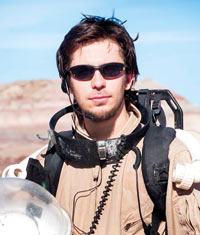Businesses should not restrict employees from experimenting new things – Dr. Dragos, NASA scientist

Dr. Dragos Bratasanu
Most business entities restrict its employees from experimenting new things to improve the quality and standard of the organisation, which should not be the case. Dr. Dragos Bratasanu, an award winning scientist and consultant from NASA, making this comment, said: “Thinking about a problem is the worst way of trying to solve the problem. Do it first and then think about it. Unless you do it you never know your capabilities and successes.” Dr. Dragos made this comment to the Business Times on the sidelines of the Sri Lanka Institute of Training and Development (SLITAD) National Conference 2016 held at the BMICH in Colombo recently.
Delivering a keynote on ‘How NASA build teams’, he said, “In any orgnisation people make mistakes all the time, but correcting and trying to avoid them the next time is the ideal solution. It’s the social context that drives our behaviour, addictions and failure. It’s extremely difficult to stand against the social context.” He also spoke about the dimensions that NASA follows to achieve many milestones. An employee needs to feel valued, need to feel included, need to have hope and purpose and the need to have the certainty. He also mentioned four main things an employee should possess. An employee in an organisation should express authentic appreciation, keep all agreements, define reality and commitment and accept full accountability.
Minister of Skills Development and Vocational Training Mahinda Samarasinghe at the conference expressing his personal view stated that the government of Sri Lanka should not get involved in running enterprises. The private sector should take control of enterprises. Corporates should focus more on demand driven strategies and not on supply driven strategies. Not much concentration is focused on the demand factor than on the supply, he noted. Today 85 per cent of the people are employed in the private sector and the remaining 15 per cent only are employed in the government sector who are more focused in obtaining their pension, stated Mr. Samarasinghe. There is also a lot of demand for employable skilled youngsters where a degree alone is not going to help, but skills and talent would.
English language should be made a compulsory skill and all employees of an organisation should learn to speak, mostly the rural population who need to be taught to speak English from zero level. Mr. Samarasinghe also mentioned that many industries in Sri Lanka are globally accepted and competitive, especially in the apparel sector even amidst the removal of GSP+ concession. More and more companies should target to reach that point of growing internationally, he added. The two-day SLITAD National Conference saw many experts from industries such as banking, hospitality, insurance, automobile and IT/BPM.


